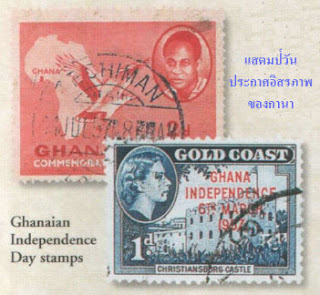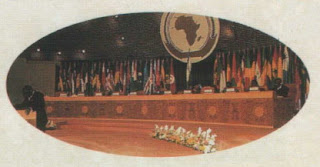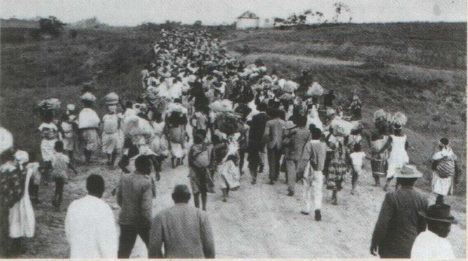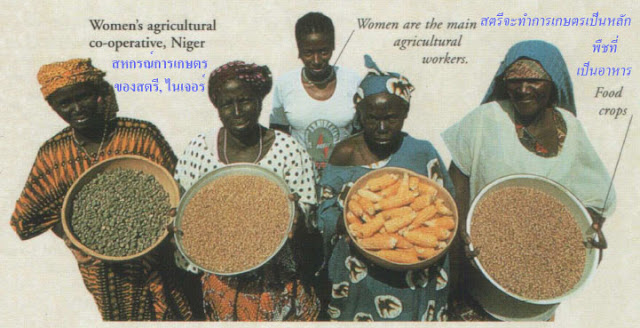Independence
After World War II,
many Africans wanted to end colonial rule, and govern
their own countries. Colonial powers such as France,
Portugal, and Britain fought to prevent this, and there
were bloody wars of independence in Algeria, Mozambique, Angola, and Zimbabwe. By the late 1960s most African countries had gained
independence, but political and economic problems
remained.
|
อิสรภาพ
หลังสิ้นสุดสงครามโลกครั้งที่
2 ชาวแอฟริกาหลายคนต้องการจะยุติการปกครองของลัทธิล่าอาณานิคม
และปกครองประเทศด้วยตนเอง อำนาจของประเทศอาณานิคม เช่น ฝรั่งเศส โปรตุเกส
และอังกฤษได้ต่อสู้ปกป้องอิสรภาพนี้ และมีสงครามเลือดเพื่ออิสรภาพในแอลจีเรีย โมซัมบิก
แองโกลา และซิมบับเว ประมาณทศวรรษที่
1960 ประเทศในทวีปแอฟริกาส่วนใหญ่ได้รับอิสรภาพ
แต่ยังคงมีปัญหาทางการเมืองและเศรษฐกิจ
|
|||
Gold Coast
One of the first
colonies to become independent was the former British colony of the Gold Coast. After World War II, anti-colonial feeling had intensified, and, in 1957, the state of Ghana
(which was named after a powerful West
African medieval empire) became independent. A leading nationalist, Kwame Nkrumah (1909-72) became the new country's first prime minister. In
1960, Nkrumah declared Ghana a republic and himself
president for life. He became increasingly dictatorial,
while drawing ever further away from the west. In 1966, a police-military coup overthrew Nkrumah.
|
โกลด์โคสต์
อาณานิคมแรกแห่งหนึ่งที่ได้รับอิสรภาพคืออาณานิคมของอังกฤษแต่เดิม
ชื่อว่า โกลด์โคสต์ (ปัจจุบันคือประเทศกานา) หลังจากสงครามโลกครั้งที่ 2 ความรู้สึกต่อต้านลัทธิล่าอาณานิคมได้ทวีความรุนแรงมากขึ้นและในปี
ค.ศ. 1957 (พ. ศ. 2500) รัฐกานา
(ซึ่งได้รับการตั้งชื่อตามจักรวรรดิยุคกลางของแอฟริกาตะวันตกที่มีอิทธิพล) ก็ได้รับอิสรภาพ
นักชาตินิยมชั้นนำ ชื่อ กวาเม
อึนกรูมา (Kwame Nkrumah) (ค.ศ. 1909-72 =
พ.ศ. 2452 – 2515 อายุ 63 ปี) กลายเป็นนายกรัฐมนตรีคนแรกของประเทศใหม่ ในปี ค.ศ.
1960 (พ. ศ. 2503) อึนกรูมาได้ประกาศเป็นสาธารณรัฐกานาและประกาศตนเองเป็นประธานาธิบดีเพื่อชีวิต
เขากลายเป็นเผด็จการมากขึ้น กินพื้นที่ไกลออกไปไกลจากทิศตะวันตก ในปี ค.ศ. 1966
(พ. ศ. 2509) การรัฐประหารของทหารตำรวจได้ล้มล้างอึนกรูมา
|
Organization of
African Unity
In 1963, the heads of
30 independent African states met to form the OAU (Organization of African Unity). Its aim was to promote political and economic co-operation between the states, and help
colonies achieve independence.
|
องค์การเอกภาพแอฟริกา
ในปี
ค.ศ. 1963 (พ.ศ. 2506) รัฐแอฟริกาที่เป็นอิสรภาพระดับผู้นำ 30 รัฐ
ได้ประชุมกันเพื่อก่อตั้งองค์การเอกภาพแอฟริกา (OAU) มีวัตถุประสงค์เพื่อส่งเสริมการร่วมมือกันด้านการเมืองและด้านเศรษฐกิจระหว่างรัฐ
และช่วยเหลือประเทศที่เป็นอาณานิคมให้ได้รับอิสรภาพ
|
|
|
Returning refugees, Angola/การกลับมาของผู้ลี้ภัยในประเทศแองโกลา
|
|||
Angola War
In 1961, Angola's people
rose in revolt against the Portuguese colonial government. The Portuguese army crushed the rebels, who fled into exile in Zaire. While in exile, the
rebels formed liberation movements, and waged guerrilla
warfare in Angola. In 1974, the liberation forces staged a military uprising, and overthrew the Portuguese, who
finally granted independence in 1975. After
independence, a bitter civil war erupted between two
political groups, both of whom wanted to govern Angola. One side was backed by South African troops, the other by Russian troops. The Angolan factions
agreed to a ceasefire in 1994.
|
สงครามแองโกลา
ในปี
ค.ศ. 1961 (พ.ศ. 2504) ประชาชนชาวแองโกลาได้ลุกฮือขึ้นปฏิวัติการปกครองของประเทศอาณานิคมโปรตุเกส
กองทัพโปรตุเกสเอาชนะผู้ก่อการกบฏครั้งนั้น ถูกขับไล่ไปในประเทศซาอีร์ ในขณะที่ถูกขับไล่
ผู้ก่อการกบฏได้ก่อรูปเป็นขบวนการเพื่อการปลดปล่อย และทำสงครามกองโจรในแองโกลา ในปี
ค.ศ. 1974 (พ.ศ. 2517) กองกำลังปลดปล่อยได้ก่อการจลาจลทางทหารและล้มล้างชาวโปรตุเกสซึ่งในที่สุดก็ได้รับอิสรภาพในปี
ค.ศ. 1975 (พ. ศ. 2518) หลังจากได้รับอิสรภาพแล้ว
สงครามกลางเมืองอันขมขื่นระหว่างกลุ่มการเมืองสองกลุ่ม ซึ่งทั้งสองกลุ่มต้องการปกครองแองโกลา
ฝ่ายหนึ่งได้รับการสนับสนุนจากกองกำลังของแอฟริกาใต้
อีกฝ่ายได้รับการสนับสนุนจากกองทัพรัสเซีย
ฝ่ายแองโกลาเห็นด้วยที่จะมีการสู้รบในปี ค.ศ. 1994 (พ.ศ. 2537)
|
||
|
A taxi stands for whites, South Africa, 1967
รถแท็กซี่จดรอคนผิวขาว ประเทศแอฟริกาใต้ ค.ศ. 1967 (พ.ศ. 2510)
|
Apartheid
By the 1980s, only
South Africa was still trying to retain white-minority power. The
white government had passed the Apartheid (separateness) Policy in 1948, which classified people
according to race. Under apartheid,
those classified as Black, Colored, or Asian had few
rights. Apartheid was abolished in 1994.
|
นโยบายการแบ่งแยกสีผิว
ประมาณทศวรรษที่ 1980
มีเพียงประเทศแอฟริกาใต้เท่านั้นที่ยังคงพยายามรักษาอำนาจชนกลุ่มน้อยผิวขาว
รัฐบาลผิวขาวได้ดำเนินการตามนโยบายแบ่งแยกสีผิว (การแบ่งแยกสีผิว) ในปี ค.ศ.
1948 (พ. ศ. 2491) ซึ่งจำแนกบุคคลตามเชื้อชาติ
ภายใต้การแบ่งแยกสีผิว การจัดประเภทเป็นสีดำ ชาวผิวสีหรือชาวเอเชียมีสิทธิ์เพียงเล็กน้อย
การแบ่งแยกสีผิวถูกยกเลิกเมื่อปี ค.ศ. 1994 (พ. ศ. 2537)
|
Modern Africa
Mineral-rich
Africa has a thriving mining industry. More
recently, new African electronics plants are specializing in the assembly of imported
electronic components.
|
แอฟริกาสมัยใหม่
ทวีปแอฟริกาที่อุดมไปด้วยแร่มีอุตสาหกรรมเหมืองแร่ที่เฟื่องฟู
เมื่อไม่นานมานี้โรงงานอิเล็กทรอนิกส์แห่งใหม่ในแอฟริกามีความเชี่ยวชาญในการประกอบชิ้นส่วนอิเล็กทรอนิกส์ที่นำเข้า
|
Tourism
A century ago, East
African governments established game reserves and parks
to protect wildlife from hunters. Today,
tourists pay to stay in the parks and go on safari to
see the wild animals. Kenya now
makes more money from tourism than from any other source.
|
การท่องเที่ยว
เมื่อหนึ่งศตวรรษที่ผ่านมา
รัฐบาลแอฟริกาตะวันออกได้จัดตั้งเขตสงวนและสวนสาธารณะเพื่อปกป้องสัตว์ป่าจากนักล่า
ปัจจุบันนี้ นักท่องเที่ยวจะต้องจ่ายเงินในการพำนักอยู่ในสวนสาธารณะและไปเที่ยวซาฟารีเพื่อดูสัตว์ป่า
ปัจจุบันนี้ ประเทศเคนยาสร้างรายได้จากการท่องเที่ยวมากกว่าจากแหล่งอื่น
|
|
Village co-operatives
Agricultural workers (mainly women) set
up village cooperatives to grow food crops,
which they sell at the local market. This
reverses a situation that existed under colonial
governments, when small-scale
farmers were forced to grow cash
crops (coffee, groundnuts, cocoa, and cotton) to sell to
large European companies. The
farmers could not grow food crops for themselves,
and had to buy expensive imports, such as rice.
|
สหกรณ์หมู่บ้าน
เกษตรกร (ส่วนใหญ่เป็นผู้หญิง)
ได้จัดตั้งสหกรณ์หมู่บ้านขึ้นเพื่อปลูกพืชที่เป็นอาหารซึ่งขายในตลาดในประเทศ
นี่เป็นการกลับสถานการณ์ที่เกิดขึ้นภายใต้รัฐบาลอาณานิคม เมื่อเกษตรกรรายย่อยถูกบังคับให้ปลูกพืชเพื่อการค้า
(กาแฟ ถั่วลิสง โกโก้และฝ้าย) เพื่อขายให้กับบริษัทที่มีขนาดใหญ่ในยุโรป
เกษตรกรไม่สามารถปลูกพืชอาหารให้ตัวเองได้และต้องซื้อสินค้านำเข้าที่มีราคาแพง เช่น
ข้าว
|
|
Environmental
devastation
In semi-arid
areas of Africa, such as Somalia, land is gradually
turning into desert. Since the
1950s, there has been a fall in the average annual rainfall,
and much of the land has become very dry. The
people have often over-used the
land for cash crops, and cut down the trees for firewood.
|
การทำลายล้างสิ่งแวดล้อม
ในพื้นที่กึ่งแห้งแล้งของแอฟริกา
เช่น โซมาเลีย ที่ดินค่อย ๆ เปลี่ยนเป็นทะเลทราย นับตั้งแต่ทศวรรษที่ 1950 เป็นต้นมา
โดยเฉลี่ยก็มีฝนตกประจำปีในฤดูฝนและพื้นที่ส่วนมากมีความแห้งแล้ง
ประชาชนส่วนใหญ่มักใช้ที่ดินเพื่อปลูกพืชเพื่อการค้ามากเกินไปและตัดต้นไม้สำหรับทำฟืน
|
Ken Saro-Wiwa
Ken Saro-Wiwa (1941-1995), a human rights campaigner, was hanged along
with eight others by Nigeria's military government. His "crime" was
to speak out against the pollution of tribal lands by government-backed
international oil companies.
|
เคน ซาโร-วิวา
เคน ซาโร-วิวา (ค.ศ. 1941-1995 =
พ.ศ. 2484 – 2538 อายุ 54 ปี) นักสิทธิมนุษยชนถูกแขวนคอพร้อมกับเพื่อนอีกแปดคนโดยรัฐบาลทหารไนจีเรีย
"อาชญากรรม" ของเขาคือการออกมาพูดต่อต้านมลพิษที่มีต่อแผ่นดินของชนเผ่าซึ่งดำเนินการโดยบริษัทน้ำมันนานาชาติที่รัฐบาลสนับสนุน
|
|
 |
| African carving/รูปแกะสลักของแอฟริกา |
|
Timeline
|
|
เส้นเวลา
|
|
2500 BC Climatic
changes in the Sahara region force people to move southward.
|
|
2500 ปีก่อนคริสตกาล การเปลี่ยนแปลงด้านบรรยากาศในภิภาคทะเลทรายสะฮาราบังคับให้ประชาชนอพยพไปทางใต้
|
|
c.600
BC Kushite people of Sudan expand and base their capital at Meroe.
|
|
ศตวรรษที่ 600 ก่อนคริสตกาล
ชาวกูชแห่งซูดานได้ขยับขยายและตั้งเมืองหลวงของตนเองที่เมโร
|
|
c.AD
320—25 King Ezama of Aksum becomes
Christian.
|
|
ค.ศ. 320 – 325 กษัตริย์เอซามา
(น่าจะเอซานา) แห่งอักซุมหันไปนับถือศาสนาคริสต์
|
|
500-1300 The kingdom of Ghana controls trans-Saharan trade.
|
|
ค.ศ. 500-1300 (พ.ศ. 1043 – 1843)
จักรวรรดิกานาครอบครองเส้นทางการค้าข้ามทะเลทรายสะฮารา
|
|
641 Arabs conquer
Egypt, and convert it to Islam.
|
|
ค.ศ. 641 (พ.ศ. 1184) อาหรับพิชิตอียิปต์และเปลี่ยนให้มานับถือศาสนาอิสลาม
|
|
600s The empire based
at Aksum begins to decline.
|
|
ศตวรรษที่ 600 จักรวรรดิที่ตั้งฐานที่อักซุมเริ่มเสื่อมลง
|
|
1497 Portuguese
explorers land on east coast, after sailing
around Africa.
|
|
ค.ศ. 1497 (พ.ศ. 2040)
นักสำรวจชาวโปรตุเกสขึ้นฝั่งที่ชายทะเลตะวันออก หลังจากแล่นเรือไปรอบ ๆ
ทวีปแอฟริกา
|
|
1900 Most of the
Sahara region comes under French colonial
rule.
|
|
ค.ศ. 1900 (พ.ศ. 2443)
ภูมิภาคทะเลทรายสะฮาราตกอยู่ในการปกครองของอาณานิคมฝรั่งเศส
|
|
1940 Italian forces
invade North Africa; Germans follow
one year later.
|
|
ค.ศ. 1940 (พ.ศ. 2483) กองทัพอิตาลีบุรุกแอฟริกาเหนือ
เยอรมันก็ทำตามในปีต่อมา
|
|
1945 League of Arab
States is founded; it includes eight African
nations.
|
|
ค.ศ. 1945 (พ.ศ. 2488) ก่อตั้งสันนิบาตอาหรับ
ประกอบด้วยชาติแอฟริกา 8 ชาติ
|
|
1973-75
Horn of Africa suffers a severe drought.
|
|
ค.ศ. 1973-75 (พ.ศ. 2516-18) จะงอยแอฟริกาประสบภาวะแห้งแล้งอย่างรุนแรง
|
|
1994-95
In Rwanda 800,000 Hutus are massacred
by Tutsis; millions flee the country.
|
|
ค.ศ. 1994-95 (พ.ศ. 2537-38) ชาวฮูดู 800,0000 คน
ถูกสังหารหมู่โดยชาวทุตซี หลายล้านคนหนึออกจากประเทศ
|









